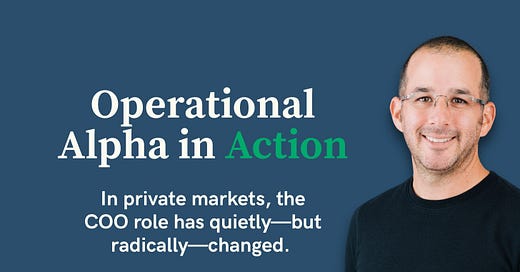Operational Alpha in Action
In private markets, the COO role has quietly—but radically—changed.
In private markets, it’s easy to focus on the headline numbers: AUM growth, investment returns, capital raised.
But beneath the surface, another driver of outperformance is gaining attention—operational alpha.
It’s no longer enough for private markets firms to simply make good investment decisions. Increasingly, investors and allocators are asking: How well is the firm actually run? Who’s managing the complexity of scaling capital, people, technology, and risk in an uncertain market?
In this latest episode of The Distribution that drops on Friday May 9th, part of my ongoing series on operational alpha, I spoke with a Sarah Schwarzschild, COO of Mavik Capital Management, who offered a window into how operational leaders are rewriting the playbook inside private markets firms. This is the first in a 3 part (at least) series.
And it’s not a back-office story.
This conversation reinforced what I’m seeing across the industry: the COO is no longer behind the scenes. They’re shaping strategy, accelerating decisions, and building the systems that enable agility at scale.
Here are a few takeaways that stood out:
➡️ The modern COO is a strategic partner, not just an operator.
Historically, operations was seen as the plumbing—necessary but not strategic. That’s changed. Today’s COO sits at the intersection of operations, technology, and investment strategy. Their mandate isn’t just to make things work—it’s to make them better, faster, and more resilient. In many firms, they hold a seat at the investment committee, ensuring operational risks and execution realities are baked into every deal.
➡️ Flexibility is no longer a cultural “nice to have”—it’s a competitive advantage.
Rigid hierarchies and processes slow down decision-making. Firms that embed flexibility into their structures—whether it’s how ICs are scheduled or how teams collaborate—are better able to capitalize on market dislocations. Operational leaders are designing org charts and workflows that prioritize speed without sacrificing rigor.
➡️ Feedback loops reduce friction.
In the episode, we talked about building cultures where feedback isn’t an annual performance review—it’s a weekly operating rhythm. Continuous, structured feedback creates alignment, flags risks earlier, and keeps priorities sharp. It’s not just about giving feedback to people; it’s about using feedback to fine-tune processes, eliminate roadblocks, and sustain operational momentum.
➡️ Technology is no longer optional—it’s foundational to alpha.
The private markets industry is still catching up to other sectors in technology adoption. Many firms are running core workflows through spreadsheets, disconnected systems, and manual reporting processes. Operational leaders are driving the shift toward platforms that can eliminate redundant tasks, automate data ingestion, and deliver real-time insights. The goal? Free up capacity to focus on higher-value activities—and reduce operational drag.
➡️ Diversity of perspective strengthens decision-making.
Adding operational leaders to the investment committee broadens the lens on every deal. Beyond underwriting investment risk, operational leaders ask: Can we close this? How will we fund it? Do we have the systems to support it post-close? Their perspective balances ambition with execution, helping firms avoid blind spots and improve deal quality.
Taken together, these insights point to a bigger shift underway: operational excellence is no longer a cost center or back-office function—it’s a lever for value creation.
And it matters not just to operators, but to allocators evaluating who gets their capital.
At a time when distributions have slowed, fundraising is harder, and LPs are consolidating relationships, firms that can demonstrate operational strength have an edge. Investors want to know their managers are not only great investors, but great businesses.
That’s why I’m continuing this deep dive into operational alpha across private markets.
Each episode in this series surfaces the leadership lessons, process innovations, and cultural practices that are quietly powering performance behind the scenes. Whether you’re an allocator, GP, or operating leader, my hope is these conversations give you actionable insights—and spark new ways of thinking about how value gets created inside private markets firms.
👉 Subscribe here to follow the series—and join me on LinkedIn for more conversations on operational alpha.




